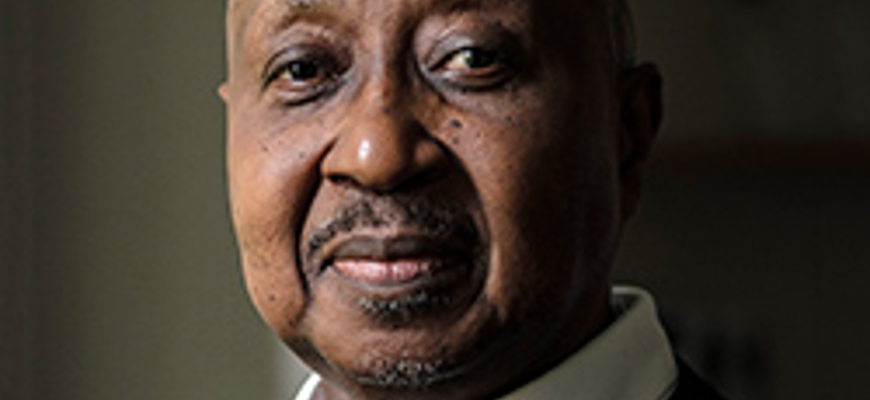Where code meets custom

Giving full effect to a code of human rights remains politically controversial, even within the mature legal systems of the UK. How is the concept faring in South Africa, a society still experiencing the echoes of the apartheid era, and one where a large majority remain in poverty despite their enfranchisement, and tribal practices and customary law remain prevalent?
This was the theme addressed in a recent lecture delivered by a distinguished South African guest at the University of Glasgow, his alma mater and the place whose degree launched his career.
It was 1974 when Thandabantu Nhlapo first came to Glasgow, a scholarship securing his entry to the LLB course and overcoming the race-based barriers that he faced in his native land. “Glasgow showed an interest in me at exactly the right time,” he affirms when asked what the city means to him. “I was running out of options. I had come back into South Africa from Lesotho with a degree that didn’t work in South Africa, so Glasgow was a big influence in my life.”
The interest continued: the university awarded him the Principal’s Prize in 1989, and an honorary doctorate in 2012. The latter recognised his achievements in a career spanning more than three decades of research, teaching, public service and social activism. He retired from the University of Cape Town in 2014 with the title Emeritus Professor of Private Law.
With research interests including African customary law and gender, women’s human rights in family law, and cultural diversity under the South African constitution, Nhlapo has served as a law reform commissioner, pioneering legislation on recognition of customary marriages, and chair of a commission set up to investigate disputes and claims arising in the traditional leadership sector. For four years also he was Deputy Ambassador to the USA.
Rights under tension
Much in demand as a public speaker, Nhlapo’s latest visit to Glasgow was to deliver the Stevenson
Lecture in Citizenship, discussing his country in the context of “Cultural Diversity, Belonging and the Law in Societies in Transition”. With many tensions and inequalities still evident within South African society, even as a modern constitution seeks to underpin rights for all, Nhlapo knows that many people there have a limited understanding of rights. “South Africans consider that the period of apartheid was a period of rightlessness,” he observes, “so we are very rights conscious. Now we are like a kid in a candy store. Some of us elderly people worry that not much is made of obligations; it’s all rights: gimme gimme gimme.
“We also have not taught democracy very well. People, particularly in the rural areas, the shanty towns, who don’t have a high level of schooling, believe that democracy is about voting and the rewards of voting – the free house that was promised by the ANC. So people say, ‘I’m not voting this year. I’ve been voting every five years and I still don’t have my house.’ ”
Other indicators also worry Nhlapo. There have been instances of groups of parents burning down their children’s school, or erecting barricades to prevent children going to school. Interviewed on TV as to why they do this to their children’s education, they say it is the only way the Government listens. “What are they fighting about? Water. Potholes in the roads. Things like that. They believe that burning things down is the way to get attention.”
Against that background the legal system clearly has a struggle to gain acceptance. To some, it represents a threat to their status; to others, it is linked to the protection of private property, and continues to throw up serious inconsistencies between the treatment of people of different races.
“Probably the most divisive word in South Africa today, sometimes known as the T word, is transformation,” Nhlapo tells me. “Transformation pervades everything. People who think the status quo is fine are fed up to the gills with transformation. But transformation is the watchword of the new South Africa. It says things cannot go back to the past, cannot stay as they are. We must be moving all the time towards a new society. Well, we haven’t got there at all.”
He and others argue that transformation of the legal system must be one of the big projects coming under this umbrella. Crucially, this includes making litigation more affordable to the millions to whom it is currently out of reach, and reducing the “simmering resentment against a legal system that is considered to be too western, which is now backed by this Rolls-Royce constitution”, in a country where many of the population lack the basics. In short, transforming the legal system is central to “persuading the majority black population that the new South Africa is made also in their own image”.
Custom: a process of change
A large part of that image, for the nine or so tribes that make up the indigenous black population, is custom. “Even when we are westernised, educated, living in the city, financially well off, some aspect of our lives is governed by custom,” Nhlapo relates. “At the very least, custom impinges in the area of obligations to family, which of course very much means the extended family. But apart from that, there are more than 20 million people in the rural areas whose actual legal system, the one that makes sense to them, that they use in their daily lives, is customary law.”
Does that make it difficult for them to accept change? “Yes. But even that statement needs to be qualified. The battle we are fighting now is to persuade people to recognise that change is built into customary law. Because the law that the courts are supposed to apply is the law that is actually guiding behaviour today in particular communities, adapted to current economic and social realities.” He explains the distinction between the “official” customary law now disapproved and jettisoned as reflecting colonial or apartheid times, and “living” customary law, that which is actually recognised in terms of the constitution.
“That’s a very flexible kind of thing. I teach marriage law, and I know for a fact that the requirements for entering into a valid customary marriage, for instance, are not the same as when the textbooks were written 20 or 40 years ago. People do what they need to do, and the difficulty of working with custom, and the courts are aware of this, is that you have to persuade a judge that the rule you are working to is the rule that is observed today in that community.”
As well as the issues of proof that arise, one problem is that “you get in society the group that wants to argue that things don’t change, who want to stick to certain positions, usually because the status quo works for them. These are usually male elders who are in a constant fight with women and with youngsters, male and female, who do see different ways of doing things”.
Rights and culture opposed?
The rules can be quite intricate, given prevailing concepts of the extended family and marrying into the family. How can attendant practices, such as a woman becoming the consort of her husband’s brother if her husband dies, be integrated with a constitutional human rights regime?
“The point I always like to make is, there are certain practices that cannot stand constitutional scrutiny,” Nhlapo replies. “The Constitutional Court struck down succession rules of customary law, rules of male primogeniture, because they discriminated against women. But the court itself is beginning to worry about how far down into daily practices the law needs to come, because there is always going to be some kind of discrimination. In customary law there are men-only jobs, women-only jobs, boys-only games, girls-only games. There are cuts of meat that are reserved for elders because of their status. So I think what we are trying to deal with is when discrimination causes actual harm. And in fact the constitution gives us an opening, because the sections against discrimination say that no one may ‘unfairly’ discriminate. So sometimes courts have returned verdicts saying it is discriminatory, i.e. two people are treated differently, but not unfairly because… and here are the reasons.”
A good example is domestic violence, which the courts are trying to stamp out. When this occurs in a customary marriage, it needs to be punished while making it clear that the attack is not on customary marriage itself. “The mistake would be to ban customary marriage because you think that is the cause of the problem, and then people say, ‘White people beat their wives too, why aren’t you banning civil marriage?’ So the careful line the courts need to walk is one of acknowledging the big values that Africans have allegiance to, while stamping out abuses.”
It is not an easy task. In the case of the widow mentioned above, the courts will recognise her right to refuse to consort with her husband’s brother, but she may still face ostracism. Nhlapo observes: “Currently the idea of human rights has a very good name in South Africa in the urban areas and amongst the educated elites. In the rural areas people think it’s just a stick to beat their culture into the ground.”
But he believes his country has chosen the right course. “The reason these are issues in South Africa is precisely because we did the right thing by subjecting customary law to constitutional supervision. Other countries in Africa don’t. So, for example, the constitution of Zimbabwe has a bill of rights, but it says this will not apply in matters relating to African marriage law or family law. And the chiefs tried it during the negotiations for our constitution, but they lost. I believe it is the right thing to subject customary law to the constitution. I think we will solve this; the law will find its own level.”
In this issue
- FAI Rules: a guide to the consultation
- Saying sorry – is it enough?
- Repairing obligations for common parts
- Journal reader survey feedback report
- Reading for pleasure
- Tax: is your firm paying over the odds?
- Opinion: Judith Robertson
- Book reviews
- Profile
- President's column
- Altered deeds? Mind the rules
- The clouds gather
- Turning points: employment law into 2017
- Policy and the public interest
- Above the minimum
- Where code meets custom
- Child orders: mind the gap
- EU law, a family affair
- People on the move
- Information age?
- The limits of free web access
- Tenant farming: the new guidance
- Insolvency: cross-border clashes
- Foul play on the agency front
- Scottish Solicitors' Discipline Tribunal
- Comm prop and the Holy Grail
- Leisure – the serious side
- New anti-money laundering support
- Law reform roundup
- Brexit: helping to shape the outcome
- Transition to Lockton – your questions answered
- Expertise plus: promoting a sector strength
- Paralegal pointers
- Time to look back – and forward
- Everything comes...
- Ask Ash






